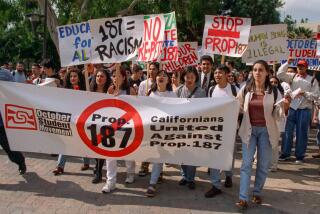Prop. 187 Ruling Awaited With Confusion and Angst
The fierce election battle over Proposition 187 is done. And even though the measure’s fate is now up to the courts, it has left racial bitterness and widespread confusion in Orange County.
The upcoming year is likely to bring further protests and economic boycotts by Latinos who are angry and offended by the anti-illegal immigration measure. Some Latino leaders fear a rise in hate crimes and heightened suspicion of brown-skinned people.
“It could create tense social relations,” said Luis Ortiz Franco, a Chapman University mathematics professor who fought against passage of the measure and predicts its enactment “could open the door for some racially white supremacist group to attack Latinos.”
For public agencies, officials are trying to look ahead but don’t know how they should implement Proposition 187.
From county officials and police chiefs to school superintendents and hospital administrators, many officials face months of wondering how they’re supposed to handle situations involving illegal immigrants.
Larry Leaman, director of the county Social Services Agency, doesn’t know, for example, whether he’ll have to identify for immigration authorities the abused children who reside here illegally and are cared for by his agency. That’s just one of many practical, and ethical, considerations on Leaman’s plate.
“As far as planning, we’ve done very little because there are many, many questions in our mind of what we would be asked to do or not do,” Leaman said.
It’s a sentiment echoing all around.
And the uncertainty is not the exclusive concern of the county’s minority communities and public servants.
Although the “Save Our State” state ballot initiative was overwhelmingly approved Nov. 8--and by two-thirds of the voters in Orange County, where the measure originated--it has yet to be implemented because of numerous lawsuits.
No less frustrated over Proposition 187’s future are its very supporters, such as Barbara Coe, founder of California Coalition for Immigration Reform who helped draft the initiative.
“We have retained an attorney and we have no intention of sitting idly by on this,” Coe said. “There are already plans to put pressure on at every level, all the way from city councils to Washington, D.C.”
Essentially, the proposition would bar illegal immigrants from public schools, and prohibit public agencies from providing them with non-emergency health and social services.
Further, the measure would require school districts, police and welfare workers to verify immigrants’ legal status and report those suspected of being in violation of immigration laws to immigration authorities and state officials.
While even some opponents acknowledge the state has major problems caused by illegal immigration, they regard Proposition 187 as the linchpin to continuing racial discord.
The Orange County Human Relations Commission is conducting an ongoing effort to ease tensions.
“Part of the polarization that’s been created will continue,” said Ken Inouye, commission chairman. “It’s one of the unfortunate fallouts from this election.”
The commission’s agenda, Inouye said, is to educate residents on how Proposition 187 would affect them, and to “begin a healing process” with a series of public seminars through 1995.
“After all, when this is all over, we still have to live together,” he said.
*
The seminars have already produced complaints about harassment and intimidation of Spanish-speaking immigrants who have been asked about their immigration status from food merchants to teachers.
Although Gov. Pete Wilson has issued an executive order to implement Proposition 187, the overriding question--whether it is constitutional--will be weighed by U.S. District Judge Mariana R. Pfaelzer in Los Angeles.
On Dec. 14, Pfaelzer ordered an injunction barring enforcement for at least six months of the measure’s controversial mandate that law enforcement officers, educators and welfare case workers verify legal status and report suspected undocumented people to authorities.
Coe’s coalition has hired Santa Monica attorney Richard Nickerbocker to defend Proposition 187. Nickerbocker said scores of pro-187 organizations will be helping defend the proposition in federal court.
The directors of county social service agencies throughout the state, like Leaman in Orange County, whose agency serves 240,000 indigent people, say there are so many mixed signals they don’t know how to proceed.
Undocumented immigrants are not eligible for welfare payments, Leaman said, but if the recipient is a child and is a U.S. citizen, “Do we report the parents who are here illegally?”
And if a victim of child abuse receives foster care provided at county’s expense, “Do we identify the victim if they are an illegal alien?” Leaman wonders.
Most county law enforcement agencies, such as Garden Grove police, say they will wait until the courts rule on the measure’s constitutionality.
According to some police chiefs, like Stanley L. Knee of Garden Grove, the ballot initiative presents a dilemma to law enforcement agencies that have worked hard to win the trust of immigrant communities, but are now viewed as enforcers of Proposition 187.
While the unabated fight over the measure moves into the courtroom, Latino community leaders have mounted boycotts against major contributors to the reelection campaign of Wilson, who strongly supported the proposition. Two targets thus far have been the Nabisco Corp. and Disneyland.
Also, there are tentative plans for Latinos and other Proposition 187 opponents in Orange County to help stage a statewide “187 Flu” sickout May 1.
Organizers said it will help demonstrate Latinos’ economic clout in the state.
The idea for a sickout occurred after the Nov. 19 death of Julio Cano, the 12-year-old Anaheim boy whose illegal immigrant parents said they delayed seeking medical treatment for their son because they feared the passage of Proposition 187 meant hospital officials would report them to immigration officials. The boy died of acute leukemia.
Fears of escalating racial incidents have been prompted by a number of reported incidents, according to Latino leaders.
At Chapman University, Chris Sandoval, a Native American with a Hispanic surname, was subjected to verbal taunts and intimidation, according to Ortiz. Sandoval, the student body president, found a note on his car’s windshield before the election advising him to “Get Out. You’re a ------ Indian. Or Maybe you’re just a Mexican. Vote yes on Proposition 187.”
“We have heard of an Orange County teacher who asked her students to raise their hands if they were immigrants,” Ortiz said. “The following day none of those students showed up in class. Those are the kinds of situations that would be exacerbated if 187 would be enforced.”
However, supporters of the proposition vehemently reject the notion that it will deepen racial divisions.
“We’ve answered that over and over,” Coe said. “This is about immigration.”
*
Angela Keefe, chairwoman of the county’s Central Labor Council and president of a hotel union, said alarm is evident among some unions with large memberships of documented immigrants.
“Even for members with employer-paid health benefits,” Keefe said, “they are in fear now. They do not want to bring in relatives who need health care because they do not want to be questioned about their immigrant status.”
The 5,000-member Hotel Employees and Restaurant Employees Union Local 681 consists mostly of Spanish-speaking immigrant workers, Keefe said. The union is focusing on helping its members become citizens by offering citizenship classes at the union headquarters and possibly at their work.
Hotel union officials have told the membership they will have to provide nothing more than the union card to get health care.
“If any health provider asks for anything more than that,” Keefe said, “they’re going to lose the business of this union.”
More to Read
Sign up for Essential California
The most important California stories and recommendations in your inbox every morning.
You may occasionally receive promotional content from the Los Angeles Times.









